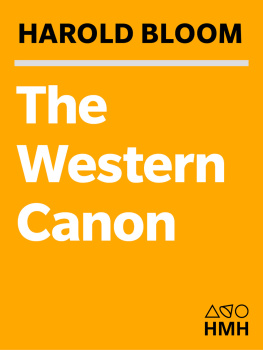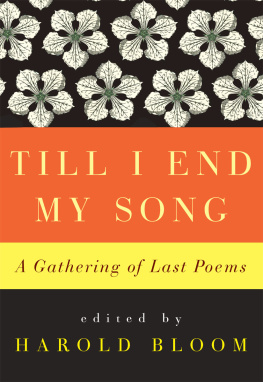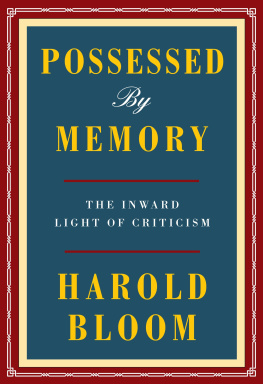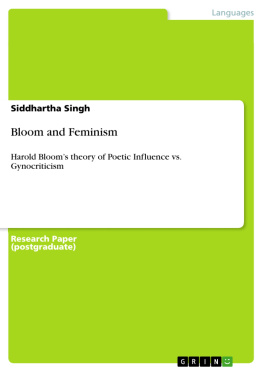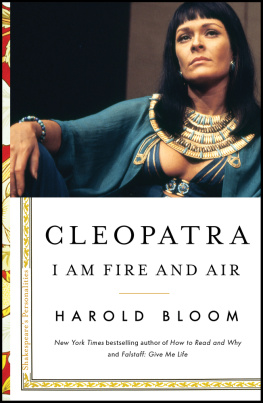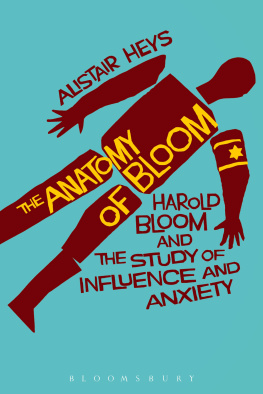Copyright 1994 by Harold Bloom
All rights reserved. No part of this publication may be reproduced or transmitted in any form or by any means, electronic or mechanical, including photocopy, recording, or any information storage and retrieval system, without permission in writing from the publisher.
For information about permission to reproduce selections from this book, write to Permissions, Houghton Mifflin Harcourt Publishing Company, 215 Park Avenue South, New York, New York 10003.
www.hmhco.com
The Library of Congress has cataloged the print edition as follows:
Bloom, Harold.
The western canon: the books and school of the ages/
by Harold Bloom.1st ed.
p. cm.
Includes bibliographical references and index.
ISBN 0-15-195747-9
1. Canon (Literature) 2. LiteratureHistory and criticism.
I. Title.
PN81.B545 1993
809dc20 93-43542
e ISBN 978-0-547-54648-3
v1.0514
For
ANNE FREEDGOOD
Acknowledgments
My editors, Anne Freedgood and Pat Strachan, and my literary agents, Glen Hartley and Lynn Chu, have made crucial contributions to this book. Richard Poirier, John Hollander, Perry Meisel, and Roberto Gonzalez Echevarria have encouraged and advised me throughout its composition. My research assistant, Martha Serpas, made possible the entire process of revision, during which she helped determine the volumes final shape. The libraries of Yale University, my endless resource for more than forty years, stoically have endured my work habits.
HAROLD BLOOM
Timothy Dwight College
Yale University
Preface and Prelude
T HIS BOOK studies twenty-six writers, necessarily with a certain nostalgia, since I seek to isolate the qualities that made these authors canonical, that is, authoritative in our culture. Aesthetic value is sometimes regarded as a suggestion of Immanuel Kants rather than an actuality, but that has not been my experience during a lifetime of reading. Things have however fallen apart, the center has not held, and mere anarchy is in the process of being unleashed upon what used to be called the learned world. Mimic cultural wars do not much interest me; what I have to say about our current squalors is in my first and last chapters. Here I wish to explain the organization of this book and to account for my choice of these twenty-six writers from among the many hundreds in what once was considered to be the Western Canon.
Giambattista Vico, in his New Science, posited a cycle of three phasesTheocratic, Aristocratic, Democraticfollowed by a chaos out of which a New Theocratic Age would at last emerge. Joyce made grand seriocomic use of Vico in organizing FinnegansWake, and I have followed in the wake of the Wake, except that I have omitted the literature of the Theocratic Age. My historical sequence begins with Dante and concludes with Samuel Beckett, though I have not always followed strict chronological order. Thus, I have begun the Aristocratic Age with Shakespeare, because he is the central figure of the Western Canon, and I have subsequently considered him in relation to nearly all the others, from Chaucer and Montaigne, who affected him, through many of those he influencedMilton, Dr. Johnson, Goethe, Ibsen, Joyce, and Beckett among themas well as those who attempted to reject him: Tolstoy in particular, along with Freud, who appropriated Shakespeare while insisting that the Earl of Oxford had done the writing for the man from Stratford.
The choice of authors here is not so arbitrary as it may seem. They have been selected for both their sublimity and their representative nature: a book about twenty-six writers is possible, but not a book about four hundred. Certainly the major Western writers since Dante are hereChaucer, Cervantes, Montaigne, Shakespeare, Goethe, Wordsworth, Dickens, Tolstoy, Joyce, and Proust. But where are Petrarch, Rabelais, Ariosto, Spenser, Ben Jonson, Racine, Swift, Rousseau, Blake, Pushkin, Melville, Giacomo Leopardi, Henry James, Dostoevsky, Hugo, Balzac, Nietzsche, Flaubert, Baudelaire, Browning, Chekhov, Yeats, D. H. Lawrence, and so many others? I have tried to represent national canons by their crucial figures: Chaucer, Shakespeare, Milton, Wordsworth, Dickens for England; Montaigne and Molire for France; Dante for Italy; Cervantes for Spain; Tolstoy for Russia; Goethe for Germany; Borges and Neruda for Hispanic America; Whitman and Dickinson for the United States. The sequence of major dramatists is here: Shakespeare, Molire, Ibsen, and Beckett; and of novelists: Austen, Dickens, George Eliot, Tolstoy, Proust, Joyce, and Woolf. Dr. Johnson is here as the greatest of Western literary critics; it would be difficult to find his rival.
Vico did not postulate a Chaotic Age before the ricorso or return of a second Theocratic Age; but our century, while pretending to continue the Democratic Age, cannot be better characterized than as Chaotic. Its key writers are Freud, Proust, Joyce, Kafka: they personify whatever literary spirit the era possesses. Freud called himself a scientist, but he will survive as a great essayist like Montaigne or Emerson, not as the founder of a therapy already discredited (or elevated) as another episode in the long history of shamanism. I wish that there were space for more modern poets here than just Neruda and Pessoa, but no poet of our century has matched In Search of Lost Time, Ulysses, or Finnegans Wake, the essays of Freud, or the parables and tales of Kafka.
With most of these twenty-six writers, I have tried to confront greatness directly: to ask what makes the author and the works canonical. The answer, more often than not, has turned out to be strangeness, a mode of originality that either cannot be assimilated, or that so assimilates us that we cease to see it as strange. Walter Pater defined Romanticism as adding strangeness to beauty, but I think he characterized all canonical writing rather than the Romantics as such. The cycle of achievement goes from The Divine Comedy to Endgame, from strangeness to strangeness. When you read a canonical work for a first time you encounter a stranger, an uncanny startlement rather than a fulfillment of expectations. Read freshly, all that The Divine Comedy, Paradise Lost, Faust Part Two, Hadji Murad, Peer Gynt, Ulysses, and Canto general have in common is their uncanniness, their ability to make you feel strange at home.
Shakespeare, the largest writer we ever will know, frequently gives the opposite impression: of making us at home out of doors, foreign, abroad. His powers of assimilation and of contamination are unique and constitute a perpetual challenge to universal performance and to criticism. I find it absurd and regrettable that the current criticism of Shakespearecultural materialist (NeoMarxist); New Historicist (Foucault); Feministhas abandoned the quest to meet that challenge. Shakespeare criticism is in full flight from his aesthetic supremacy and works at reducing him to the social energies of the English Renaissance, as though there were no authentic difference in aesthetic merit between the creator of Lear, Hamlet, Iago, Falstaff and his disciples such as John Webster and Thomas Middleton, The best living English critic, Sir Frank Kermode, in his Forms of Attention (1985) has issued the clearest warning I know about the fate of the canon, that is to say, in the first place, the fate of Shakespeare:
Canons, which negate the distinction between knowledge and opinion, which are instruments of survival built to be time-proof, not reason-proof, are of course deconstructible; if people think there should not be such things, they may very well find the means to destroy them. Their defense cannot any longer be undertaken by central institutional power; they cannot any longer be compulsory, though it is hard to see how the normal operation of learned institutions, including recruitment, can manage without them.
Next page
